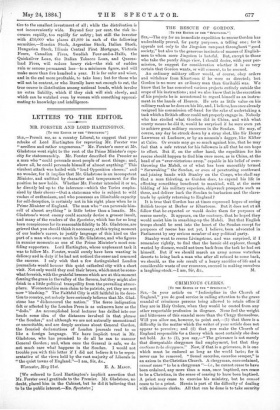LETTERS TO THE EDITOR.
MR. FORSTER AND LORD HARTINGTON. [To THE EDITOR OF TEE "SPECTATOR."] .Sin,—Permit me, as a country Liberal, to suggest that your rebuke of Lord Hartington for reproving Mr. Forster was " needless and rather ungenerous." Mr. Forster's sneer at Mr. Gladstone went right to the root of the Prime Minister's capa- city for statesmanship. Mr. Forster described the Premier as -a man who " could persuade most people of most things ; and, above all, he could persuade himself of almost anything." This virulent attack was hailed with " loud Opposition cheers ;" and no wonder, for it implies that Mr. Gladstone is an incompetent Minister, and unfitted by character and temperament for the position he now holds. Whether Mr. Forster intended it or no, he directly led up to the inference—which the Tories empha- sised by their cheers—that a statesman who is subject to wild washes of enthusiasm, and who possesses an illimitable capacity for self-deception, is certainly not in his right place when he is Prime Minister of England. The man who " can persuade him- self of almost anything" is little better than a lunatic. Mr. Gladstone's worst enemy could scarcely devise a grosser insult, and many of the readers of the Spectator, which has for so long been conspicuous for its reasonable fidelity to Mr. Gladstone, are grieved that you should think it necessary, at this trying moment of our leader's career, to justify language of this kind on the part of a man who owes much to Mr. Gladstone, and who figures in sunnier moments as one of the Prime Minister's most con- fiding supporters. Lord Hartington, whose unpleasant task it was to follow Mr. Forster, would surely have been wanting in delicacy and in duty if he had not noticed the sneer and censured the sneerer. I only wish that a few distinguished London journalists would honour this quiet cathedral city with a short visit. Not only would they cool their brows, which must be some- what feverish, with the grateful breezes which are at this moment fanning the grass in the valley of the Severn, but they might also drink in a little political tranquility from the prevailing atmos- phere. Worcestershire men claim to be patriots, yet they are not now "blushing." The Faithful City is still faithful in its devo- tion to country, yet nobody here seriously believes that Mr. Glad- stone has " dishonoured the nation." The fierce indignation felt or affected by the London Press is as unknown here as the "dodo." An accomplished local lecturer has drilled into our heads some idea of the distances involved in that phrase "the Soudan;" and although we are not naturally unemotional or unexcitable, and are deeply anxious about General Gordon, the frenzied declamations of London journals read to us like a foreign language. We have implicit trust in Mr. Gladstone, who has promised to do all he can to succour General Gordon ; and, when once the General is safe, we do not much care what happens in the Soudan. I would not trouble you with this letter if I did not believe it to be repre- sentative of the views held by the vast majority of Liberals in the quiet towns of England."—I am, Sir, &c., [We referred to Lord Hartington's implicit assertion that Mr. Forster owed gratitude to the Premier. Mr. Gladstone, no doubt, placed him in the Cabinet, but he did it believing that to be the public interest. —ED. Spectator.]
































 Previous page
Previous page